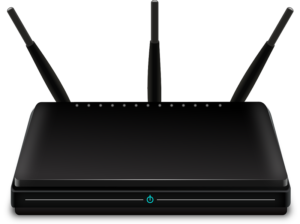
Wireless access points are essential tools for ensuring reliable Internet access for multiple users.
A wireless access point is essential for any business or institution that needs to support many wireless Internet users. Compared to a traditional wireless router, the wireless access point offers several distinct advantages. Read on to discover how a wireless access point can facilitate the best Internet connection for your needs.
What Makes An Access Point Different Than a Router?
Essentially, an access point is useful for enabling more devices to connect to a network while a router is what sets up a Local Area Network, or LAN. But let’s break down the details between these two technologies:
Routers
A router connects multiple devices to form a LAN and provides Internet access to all devices connected to the router. Devices can connect to routers via Ethernet cables or Wi-Fi. For the router to distribute data to these devices within the LAN, the router must be connected to an Internet service provider’s CPE, or Customer Premises Equipment, via another Ethernet cable. A router acts as a hub that sets up a LAN and manages all devices and communication in it.
Access Points
APs are wireless network devices that act as a portal for devices to connect to a LAN. An AP is useful for extending the wireless coverage of an existing network and increasing the number of potential users. High-speed Ethernet cables run from a router to an access point, which transforms the wired signal of the router into the wireless signal of the access point. An AP is a sub-device within a LAN that provides another location for devices to connect from, which enables more devices on the network without slowing down connectivity. A router can sometimes act as an access point, but not all access points can be routers.
More User Access
While a wireless router can only support about 10-20 users access at a time, a wireless access point can allow over 50 or even hundreds of users access. The wireless AP has a much stronger ability to send and receive signals, which enables such high usage. If you are considering wireless Internet for a large area, using a wireless access point gives you a better guarantee of efficiency.
Broader Transmission Range
A wireless router’s signal transmission can cover about a dozen meters before its signal is lost. A wireless access point, however, can cover up to 100-300 meters. The broad range is excellent for businesses that cover large office spaces or multiple buildings. With a wireless access point, employees can communicate across buildings and larger distances.
Flexible Networking
The networking mode of a wireless router is low flexibility and relatively single. A wireless access point has a variety of modes to choose from, to encourage flexible usage. These modes include Simplex AP, Wireless Client, Wireless Bridge, Multi-point Bridge, and more.
Multi-Access Point Interconnection
Multi-AP applications are often found in businesses. The coverage of a single AP may be too limited for a large enterprise, so to extend the coverage of wireless networks, a multi-AP interconnection will be used. The multi-AP interconnection allows clients to roam within the network seamlessly.
What to Consider Before Installing
Cost
The wireless access point will cost more than a wireless router because there is more coverage. If your business requires multi-AP interconnection, that will raise the price as well. However, the price is worth it for reliable and consistent Internet access.
Equipment
A wireless access point needs to be used in conjunction with specific equipment, including switches, controllers, and ethernet hubs. The required equipment can be intimidating if you are installing yourself. However, if you hire a professional installer, they can set up your wireless access point and inform you of the necessary maintenance required to run the wireless AP.
Who Benefits From a Wireless AP?
A wireless router, which is cheaper and more straightforward, is best for home users and students who have basic Internet connectivity needs. Wireless access points are better for businesses because of its broad transmission range, high users access, and stronger signal sending and receiving capabilities. Wireless APs also have a better safety performance, which is essential for any business.
Get in Touch with FiberPlus
FiberPlus has been providing data communication solutions for over 25 years in the Mid Atlantic Region for a number of different markets. What began as a cable installation company for Local Area Networks has grown into a leading provider of innovative technology solutions improving the way our customers communicate and keeping them secure. Our solutions now include:
- Structured Cabling (Fiberoptic, Copper and Coax for inside and outside plant networks)
- Electronic Security Systems (Access Control & CCTV Solutions)
- Wireless Access Point installations
- Public Safety DAS – Emergency Call Stations
- Audio/Video Services (Intercoms and Display Monitors)
- Support Services
- Specialty Systems
- Design/Build Services
FiberPlus promises the communities in which we serve that we will continue to expand and evolve as new technology is introduced within the telecommunications industry.
Have any questions? Interested in one of our services? Call FiberPlus today 800-394-3301, email us at info@fiberplusinc.com, or visit our contact page. Our offices are located in the Washington, DC metro area, Richmond, VA, and Columbus, OH. In Pennsylvania, please call Pennsylvania Networks, Inc. at 814-259-3999.
Do you enjoy clicking “Like” and “Follow?” Be sure to click on our official Pinterest, Facebook, Twitter, and LinkedIn pages today!